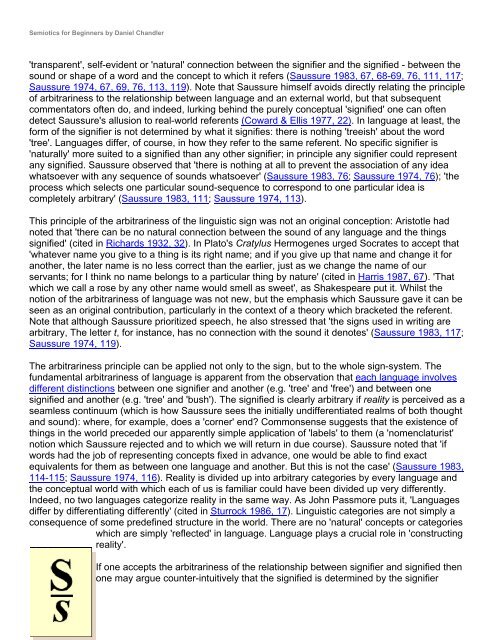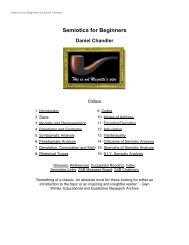Semiotics for Beginners by Daniel Chandler
Semiotics for Beginners by Daniel Chandler
Semiotics for Beginners by Daniel Chandler
You also want an ePaper? Increase the reach of your titles
YUMPU automatically turns print PDFs into web optimized ePapers that Google loves.
<strong>Semiotics</strong> <strong>for</strong> <strong>Beginners</strong> <strong>by</strong> <strong>Daniel</strong> <strong>Chandler</strong><br />
'transparent', self-evident or 'natural' connection between the signifier and the signified - between the<br />
sound or shape of a word and the concept to which it refers (Saussure 1983, 67, 68-69, 76, 111, 117;<br />
Saussure 1974, 67, 69, 76, 113, 119). Note that Saussure himself avoids directly relating the principle<br />
of arbitrariness to the relationship between language and an external world, but that subsequent<br />
commentators often do, and indeed, lurking behind the purely conceptual 'signified' one can often<br />
detect Saussure's allusion to real-world referents (Coward & Ellis 1977, 22). In language at least, the<br />
<strong>for</strong>m of the signifier is not determined <strong>by</strong> what it signifies: there is nothing 'treeish' about the word<br />
'tree'. Languages differ, of course, in how they refer to the same referent. No specific signifier is<br />
'naturally' more suited to a signified than any other signifier; in principle any signifier could represent<br />
any signified. Saussure observed that 'there is nothing at all to prevent the association of any idea<br />
whatsoever with any sequence of sounds whatsoever' (Saussure 1983, 76; Saussure 1974, 76); 'the<br />
process which selects one particular sound-sequence to correspond to one particular idea is<br />
completely arbitrary' (Saussure 1983, 111; Saussure 1974, 113).<br />
This principle of the arbitrariness of the linguistic sign was not an original conception: Aristotle had<br />
noted that 'there can be no natural connection between the sound of any language and the things<br />
signified' (cited in Richards 1932, 32). In Plato's Cratylus Hermogenes urged Socrates to accept that<br />
'whatever name you give to a thing is its right name; and if you give up that name and change it <strong>for</strong><br />
another, the later name is no less correct than the earlier, just as we change the name of our<br />
servants; <strong>for</strong> I think no name belongs to a particular thing <strong>by</strong> nature' (cited in Harris 1987, 67). 'That<br />
which we call a rose <strong>by</strong> any other name would smell as sweet', as Shakespeare put it. Whilst the<br />
notion of the arbitrariness of language was not new, but the emphasis which Saussure gave it can be<br />
seen as an original contribution, particularly in the context of a theory which bracketed the referent.<br />
Note that although Saussure prioritized speech, he also stressed that 'the signs used in writing are<br />
arbitrary, The letter t, <strong>for</strong> instance, has no connection with the sound it denotes' (Saussure 1983, 117;<br />
Saussure 1974, 119).<br />
The arbitrariness principle can be applied not only to the sign, but to the whole sign-system. The<br />
fundamental arbitrariness of language is apparent from the observation that each language involves<br />
different distinctions between one signifier and another (e.g. 'tree' and 'free') and between one<br />
signified and another (e.g. 'tree' and 'bush'). The signified is clearly arbitrary if reality is perceived as a<br />
seamless continuum (which is how Saussure sees the initially undifferentiated realms of both thought<br />
and sound): where, <strong>for</strong> example, does a 'corner' end? Commonsense suggests that the existence of<br />
things in the world preceded our apparently simple application of 'labels' to them (a 'nomenclaturist'<br />
notion which Saussure rejected and to which we will return in due course). Saussure noted that 'if<br />
words had the job of representing concepts fixed in advance, one would be able to find exact<br />
equivalents <strong>for</strong> them as between one language and another. But this is not the case' (Saussure 1983,<br />
114-115; Saussure 1974, 116). Reality is divided up into arbitrary categories <strong>by</strong> every language and<br />
the conceptual world with which each of us is familiar could have been divided up very differently.<br />
Indeed, no two languages categorize reality in the same way. As John Passmore puts it, 'Languages<br />
differ <strong>by</strong> differentiating differently' (cited in Sturrock 1986, 17). Linguistic categories are not simply a<br />
consequence of some predefined structure in the world. There are no 'natural' concepts or categories<br />
which are simply 'reflected' in language. Language plays a crucial role in 'constructing<br />
reality'.<br />
If one accepts the arbitrariness of the relationship between signifier and signified then<br />
one may argue counter-intuitively that the signified is determined <strong>by</strong> the signifier




